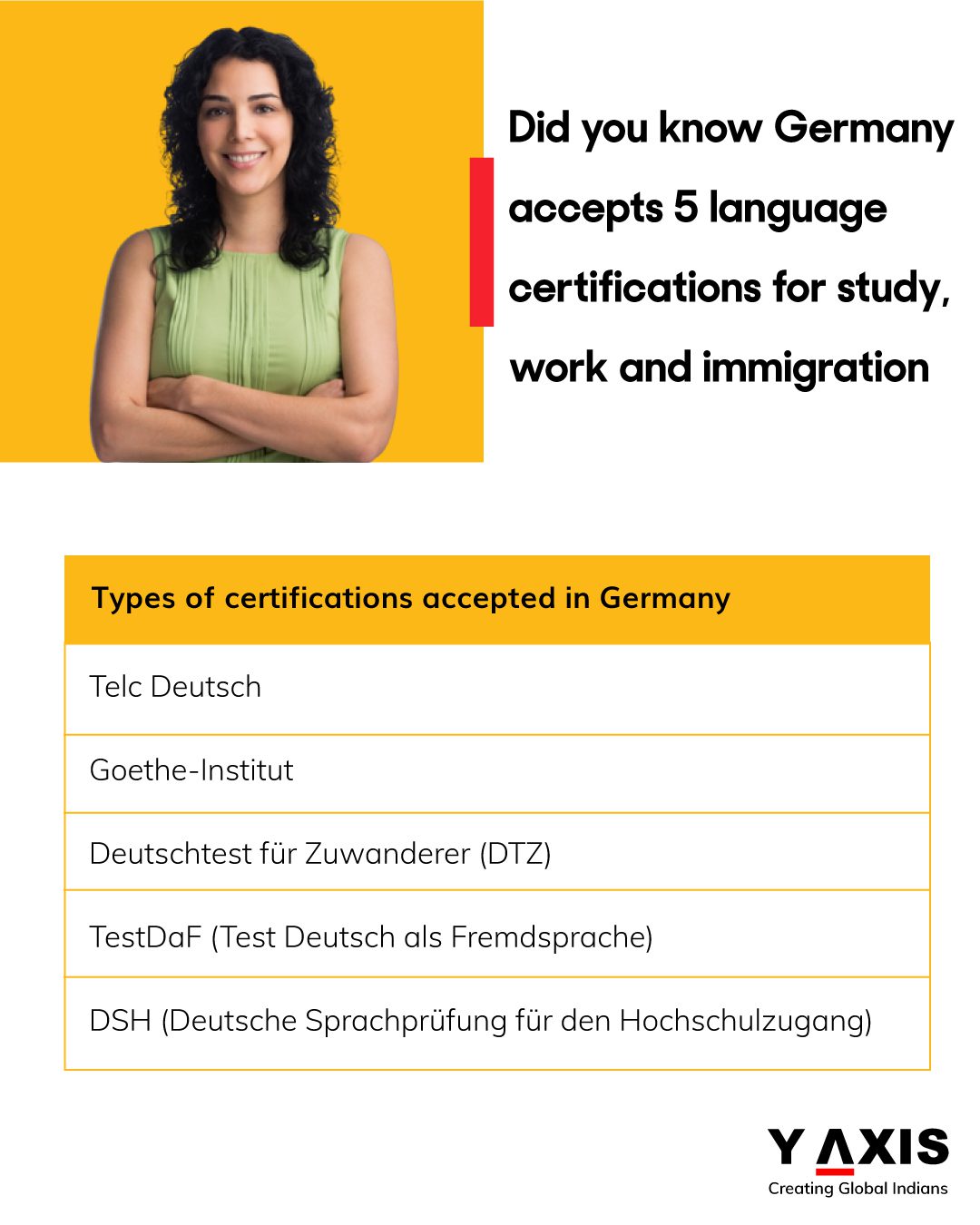Posted on July 25 2022
Did you know Germany accepts 5 language certifications for study, work and immigration
By , Editor
Updated April 03 2023
Objective
Expats require German language certification to move to Germany. There are multiple types of certifications available worldwide, and most certifications are recognized by Germany and abroad.
Types of certifications accepted in Germany
Most of the migrants who chose Germany to study, work, or migrate require German Language Certification for many ample reasons. The type of certification you choose depends upon the reasons you are seeking a German language certification.
Following are the tests and certificates often accepted by German institutions and authorities:
Deutschtest für Zuwanderer (DTZ)
The Deutschtest für Zuwanderer (DTZ), is a language certificate of German Language for Immigrants designed especially for ex-pats in Germany and is usually taken after an integration course. Passing through this test is equivalent to achieving a Common European Framework of Reference for Languages (CEFR) level A2 or B1.
Newcomers who come to Germany often need to complete the integration course and DTZ as one of the requirements for receiving a residence permit. Upon successful completion of an integration course also determines the German language ability for expedited German citizenship applications.
DSH (Deutsche Sprachprüfung für den Hochschulzugang)
DSH is one of the other language certifications accepted by universities. One of the major differences is that it has no option of taking the test online or remotely. The only option to take the DSH examination is at a German university.
Students are evaluated on skills like reading, writing, and listening apprehension, and take verbal examination. The DSH grades 1 - 3 are equivalent to CEFR levels B2 - C2.
Goethe-Institut
Goethe-Institut is an institution partly funded by the German government, which promotes German language learning and student exchange abroad. 159 institutes in 98 countries formed as a worldwide network. This institute created a series of tests, which result in a certificate of German language ability which are aligned in six levels, following the Common European Framework of Reference for Languages (CEFR).
Newcomers can take the test at any Goethe-Institut, or can also take the test at any of the institute's partners. The Goethe-Institut certificate (Zertifikat) is popularly known as a German language certification around the globe. This certificate is used to obtain a German visa, residence permit, and citizenship applications, whereas a German language certificate is a crucial need for the university entrance requirements.
Telc Deutsch
Telc is a European Language Certificates that offers language certification in 10 varieties of languages, including German. Around 2,000 test centers are available for taking up the Telc test in 20 different countries. Telc standard exams also correspond to the language levels CEFR. The Telc tests are specialized in focusing on topics such as language in the language for nurses and carers, medical language, university admission, and workplace.
The Telc tests are internationally-recognized certifications and are widely accepted in Germany for citizenship, residence permit, and visa applications.
TestDaF (Test Deutsch als Fremdsprache)
TestDaf is a German language certification for non-native German speakers who are foreign immigrants, especially for those who are pursuing studies, and applied for work in German universities. TestDaf is available in 95 different countries worldwide, which includes 170 test centers in Germany.
Students that are taking the same exam are provided graded levels 3 - 5, which are considered under the CEFR levels B2 - C1. If the student attains level 4 in the test, is qualified to meet the entrance requirements of most of the universities in Germany. Some of the universities also accept student applications with low scores.
German language proficiency levels
The above-mentioned German language certificates all teach to the levels of the Common European Framework of Reference for Languages (CEFR). It is and global standard for describing language ability. It evaluates language learning students on their reading, writing, speaking, and listening skills on a six-point scale.
Level A (Basic User)
Divided into Beginner (A1) and Elementary (A2). This is one of the basic entry-level tests, which is a minimum requirement for most international students who are awaiting for a visa or even a PR in Germany, especially those who are moving to Germany for family purposes. Generally, between 60 and 200 hours of guided study to achieve.
Level B (Independent User)
Level B is divided into B1 (Intermediate) and B2 (Upper-intermediate). The student needs to attain a minimum of level B1 to be qualified for German citizenship. To obtain a B2 level, the student needs 650 hours of study.
Level C (Proficient User)
This is the most effective level, and is divided between Advanced (C1) and Proficient Level (C2). Level C2 is acknowledged by all the German universities, as this level of language ability is required for taking up into German-language courses, though some institutions or universities might accept students with B2 or C1 level certificates. To attain the expected scores, students need to study at least 1200 hours to attain level C2.
Willing to study in Germany? Contact Y-Axis, the world’s no.1 overseas career consultant.
Found this article interesting, also read...
Tags:
Language certifications
Study to Germany
Share
Options for you by Y-Axis
Get it on your mobile
Get News alerts
Contact Y-Axis

